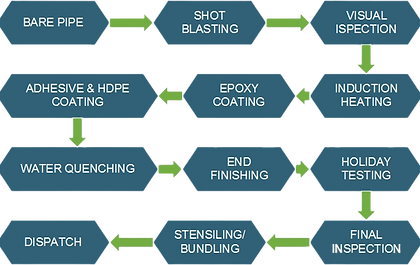

Outside Pipe Coating
About Outside Pipe Coating
Our first outside coating plant was established in 2008. Since then we have expanded to three plants that can provide coating to pipes of various sizes and lengths to any specification provide by our customers.
The reason for our growth is because we not only provide our clients best quality at a competitive price but also because of our commitment to the industry to provide innovative solutions to prevent pipe corrosion thereby protecting our customer pipes that can withstand harshest environments.
Our facility is spread out in about 150 acres which allows us to store your pipes till it is required.
Depending on your requirements and where pipes are meant to be used we offer following types of coating.
-
FBE
-
ARO
-
3 Layer
Fusion Bond Epoxy (FBE)
Fusion bonded epoxy coating, also known as fusion-bond epoxy powder coating and commonly referred to as FBE coating, is an epoxy based powder coating that is used to protect steel pipes from corrosion.

Abrasion Resistant Overcoat (ARO)
Abrasion Resistant Overcoat is dual layer coating system comprising of high performance fusion boded epoxy (FBE) layer, followed by mechanically strong top coating. The outer layer is applied during the gel cycle of the base coating system to form a tougher outer layer that is resistant to gouge, impact, abrasion and penetration. This outer layer protects the primary corrosion coating from damage during pipeline directional drilling applications, bores, river crossing and installation in rough terrain.

3 Layer Polyethylene and Polypropylene
3-Layer Polyethylene (3LPE) coating is a multi-layer anti-corrosion system designed to provide superior protection for steel pipes in demanding environments. The coating consists of three distinct layers:
-
A high-performance Fusion Bonded Epoxy (FBE) base layer, offering excellent adhesion and corrosion resistance.
-
A copolymer adhesive layer that bonds the FBE to the outer layer.
-
A tough, durable polyethylene outer layer, which provides mechanical protection and shields the pipe from external damage.
This advanced coating system ensures that pipes are resilient and durable, particularly in sour environments, and delivers long-lasting protection against corrosion, impact, and harsh conditions.

Inside Pipe Coating
About Inside Pipe Coating
Internal Pipe Coating is applied to the inner surface of pipes to create a smooth, durable layer that enhances the efficiency of fluid flow. This smooth coating reduces friction, allowing fluids to pass through with minimal resistance, which in turn saves energy, reduces transit time, and lowers overall operational costs.
The coating is engineered to withstand extreme pressures and temperatures, ensuring long-lasting performance even in the most demanding conditions, while also extending the pipe's lifespan by preventing corrosion and wear from within.
Process
The pipe coating process begins with a burn-off phase, removing organic matter from the pipes. Next, the pipes go through shot blasting, which smooths the interior surface to meet the required specifications for proper coating adhesion.
After cleaning and smoothing, a primer layer is applied, and the pipes are pre-heated to prepare them for the final coating. The coating is applied, and the pipes are then sent through a curing process to ensure proper bonding.
Finally, the pipes undergo a thorough inspection to detect any defects and verify that the coating is applied as per specifications, ensuring they are fully prepared for use.

Drill Pipe Manufacturing
About Drill Pipe Manufacturing
At Jindal Saw, we are committed to delivering innovative products using the latest and best technology available in the market. This enables us to maintain competitive costs while offering our customers top-quality products. Our integrated manufacturing process provides the flexibility to meet market demands and continuously improve production.
Our Drill Pipe line expands our offerings to the Oil and Gas industry, complementing our existing OCTG products and reinforcing our commitment to serve this sector.
Tool joints for Drill Pipes are welded to the pipe using fully automated friction welding. The weld zone is heat-treated and inspected to exceed API standards.
An automatic pipe handling system ensures defect-free production, maintaining smooth operations throughout each station.
Process
Rolled Pipe ends are either External Upset or Internal upset or Internal External upset and heat-treated full length by Quench and Temper process to achieve uniform mechanical properties.
The heat-treated pipes are 100% nondestructively inspected for possible longitudinal and transverse defects and wall thickness.
Magnetic particle inspection of the upset ends is done to ensure that the upsets are free from defects.
The OD & ID and face of the upsets are CNC machined for a clean surface as part of pipe preparation prior to welding.
Tools joints are attached to the drill pipe by friction welding to produce a high integrity solid state weld connection between the tool joint and the upset drill pipe tube.
Hard Banding and ID coating facilities are also available on customer requests.

Get a quote: (281) 573-3631






